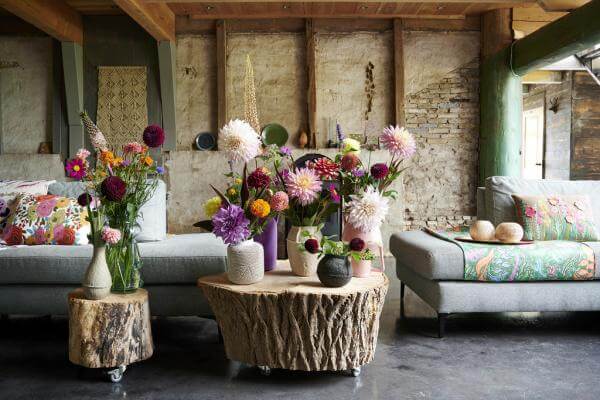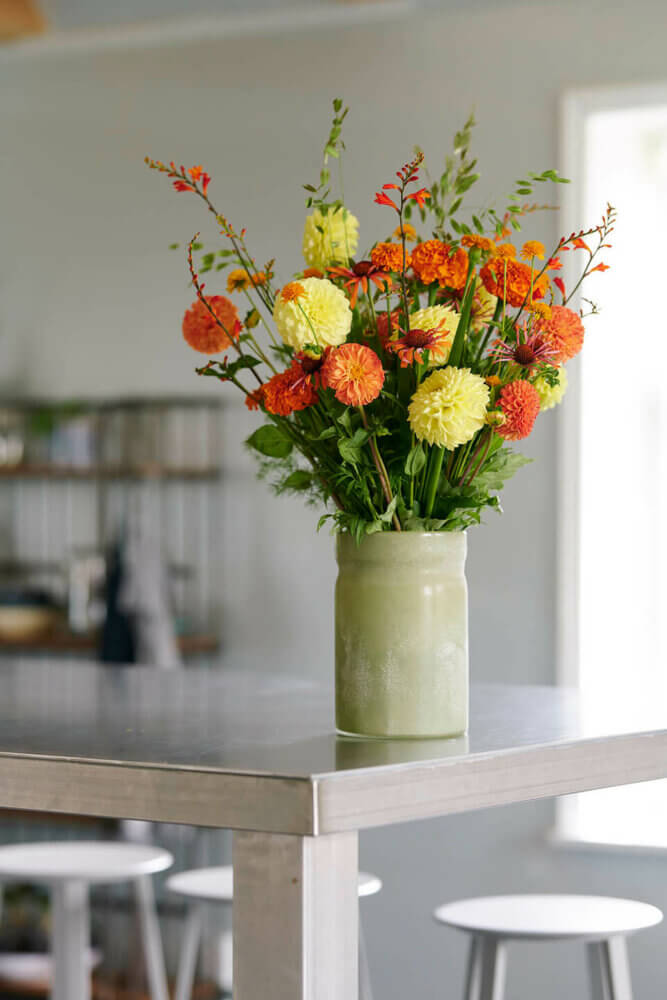
The dahlia can easily win any versatility competition. It doesn’t just thrash its rivals when it comes to colours; the enormous variation of size and flower shapes also makes it exceptional.
Origin
The dahlia is a tuberous plant that originates from Mexico, Guatemala and Belize. The flower made its way to Europe at the end of the 18th century. The name dahlia is a tribute to the Swedish botanist Anders Dahl, a student of Linnaeus. Dahlias have the most variations in colour and flower shape of all cut flowers. From dark purple to white and bicoloured and multicoloured varieties, it boasts all the colours of the rainbow. The flower’s diameter also offers endless variety, from a couple of centimetres through to large flowers with a diameter that can reach 25 cm. And then there’s the very great variety of flower shapes. The dahlia really is unique.
Assortment and range
Dahlia breeders are rapidly developing new varieties in all sorts of flower shapes, colours, lengths and sizes, as well as dahlias with an extra-long vase life. Some 1000 different cultivars are currently traded every year. The leaves range from green to somewhat russet. Amongst the flower shapes, we differentiate between single-flowered. semi-double and double-flowered varieties, pom-pom dahlias, star dahlias, (semi-)cactus dahlias, waterlily dahlias, anemone dahlias, decorative dahlias and giraffe dahlias. The biggest and most popular dahlia cultivar is ‘Café au Lait’ and its two sisters: ‘Cafe au Lait Royal’ and ‘Cafe au Lait Rosé’. The large pom-pom varieties are also becoming increasingly popular, as are dahlias with exotic flower shapes. The cultivars ‘Peaches and Cream’, ‘Crème de Cognac’ and ‘Crème de Cassis’ are characterised by their unusual colour combinations.
What to look for when buying dahlias
- Colour, flower shape and stem length.
- Also check the ripeness. Some cultivars can be harvested at a less ripe stage and then open well, whilst other cultivars need to be harvested with more open flowers.
- The number of stems per bunch: it could be five or ten.
- Make sure that dahlias are placed in enough water, because they are very thirsty. Growers add a pre-treatment to the water in order to enhance the vase life.
- When buying also check the leaf quality (drooping, yellow or botrytis) and that the flowers are not damaged or marked.
Care tips for professionals
- Always start with a clean vase, and add cut flower food.
- The stems dry out rapidly, so cut 2 to 3 cm of the stem.
- Remove leaves that are hanging in the water.
- Dahlias have a hollow stem and drink a lot of water. Top the water up every other day.
- Place the flowers in the vase before very slowly filling the vase with water, otherwise an air bubble can develop in the hollow stem that prevents water from being taken up.
- Do not place dahlias in full sun, since this increases evaporation.
Display tips for professionals
Dahlias are highly suitable for bouquets with other seasonal flowers such as hydrangea and Physalis. At the end of August combine dahlias with squashes or Physalis branches. Placing dahlias in one or more colours together in a large vasealso looks great. A snapped dahlia flower can be trimmed short and floated in a bowl of water.
Care tips for customers
- Fill a clean vase with water at room temperature.
- Add cut flower food.
- Trim the stems slightly with a sharp knife or scissors.
- Carefully remove leaves that will hang in the water.
- Top up the vase regularly with fresh water: dahlias like a drink.
- Do not place the vase in a draught, in direct sunlight or near the fruit bowl.
Source flowercouncil.co

